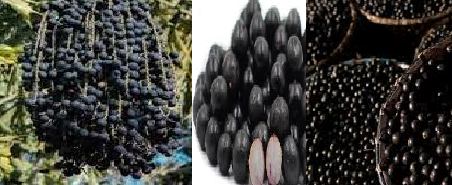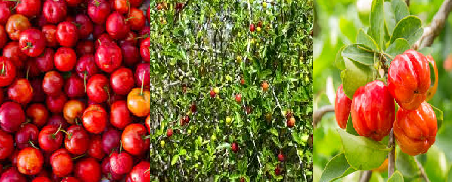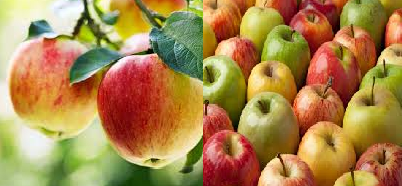Fruits That Help to Fight Wrinkle Skin and How It Work.
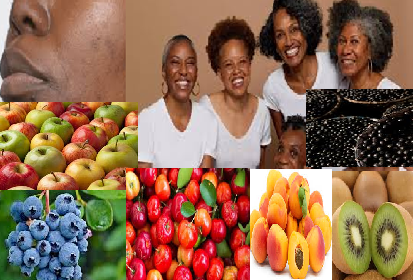
Fruits That Help to Fight Wrinkle Skin and How It Work.
Fruits are a major source of wrinkle-fighting antioxidants.
Blueberries and pomegranates are two of the richest sources of these nutrients on the planet.
Antioxidants neutralize free radicals, a leading cause of damage to the skin that results in wrinkles.
Eating fresh fruit is a boon for your skin and your overall health.
Also Read: HOW TO PRESERVE AVOCADO
The FHILL study did not include fruit in its investigation; however, as you will soon learn, there are several fruits you should include in your diet to feed your skin and guard against wrinkles.
Fruit is an important part of every healthy diet.
Because fruit is packed with vitamins, minerals, antioxidants, and other phytonutrients beneficial to your skin, it is a vital part of a diet geared toward vibrant skin.
Dietitians suggest that adults consume about 8 to 10 servings of fruits and vegetables daily.
Choose fresh fruits that are rich in color, which indicates that they are packed with antioxidants.
Avoid fruit with added sugar (such as canned fruit), and always opt for fresh fruit over fruit juice.
Here are some examples of fruits that you must not avoid
#01. AÇAI BERRY
- Perhaps the best wrinkle-fighting food on earth is açai, a berry that comes from a tall, slender Amazon palm tree native to Central and South America.
- Açai has one of the highest ORAC (antioxidant) values on earth, making it a true
- Scientists have found that açai actively fights against superoxide, one of the most damaging free radicals.
- These free radicals can damage molecules in the skin, including the collagen and elastin that keep the skin firm and
- Açai can stop the source of damage that causes wrinkles, which makes it a super-powered free radical scavenger everyone should have on their side.
- Açai is also packed with other free radicals–inhibiting antioxidants so many antioxidants that the açai is reported to have twice the antioxidant power of its superfood counterpart, the blueberry.
- The deep purple of açai berries comes from anthocyanins, a group of plant compounds that are very high in antioxidant value (and found in all red-and purple-colored fruits and vegetables).
- Twelve other flavonoid compounds are found in açai berries as well, including proanthocyanidins and resveratrol, making them an ideal food to include in your wrinkle-prevention diet.
- What’s more, scientists have discovered that the antioxidants in açai may be slow-acting, meaning that they have a lasting effect on the body and can help your skin ward off wrinkle-causing free radicals for hours after you eat.
Açai Fights Inflammation and Supports Healthy Cells
- Have you appreciated a scientist today?
- Well, perhaps you should; they have discovered that açai can also prevent
- Açai has been found to inhibit the inflammatory enzymes called COX-1 and COX-2, which play a role in both acute and chronic inflammation.
- These enzymes may seem familiar, as they are targeted by common pharmaceuticals through non-steroidal anti-inflammatory drugs (NSAIDs).
- Inflammation in the skin caused by damage, such as ultraviolet radiation, can release free radical chemicals into the skin, leading to wrinkles and an inability to fix them.
- By inhibiting inflammation, you can enjoy healthier, younger, and more radiant skin.
- Perhaps more importantly, if food can help reduce inflammation daily, you can reduce skin damage and, potentially, the formation of wrinkles.
- You may even allow your skin the time and resources it needs to repair existing wrinkles.
- Oily to the touch, açai is particularly rich in fatty acids and contains high levels of monounsaturated fatty acids.
- Commonly referred to as plant fats, these fatty acids are known to support healthy cell membranes, which make your skin more resilient to poking and prodding and potentially reduce skin damage and wrinkle
- Açai also contains polyunsaturated fatty acids thought to be beneficial to the skin by enhancing skin cell structure and discouraging
- Açai, particularly in powder form, is an excellent source of fiber.
- A 100-gram serving of the powder provides adults with their total daily recommended allowance.
Also read: How to Prepare Champagne at Home Using Elderberry Flower
Why is fiber good for your skin?
- Because it ensures that your colon is functioning optimally and eliminating toxins from your body.
- Toxins can adversely affect your overall health and the health of your
- In your skin cells, they can cause damage and divert skin-repairing energy away from wrinkle prevention to toxin repair.
- Unfortunately, açai fruit deteriorates rapidly after harvest, so it is only available as fresh produce in the tropical areas where it is locally grown.
- North Americans will have to settle for processed versions of the fruit, available at most gourmet shops and health-food stores.
- You can find açai in purée form, juice blends, smoothies, sorbets, and other products.
- It can also be frozen, dried, or freeze-dried, allowing it to be consumed in a wide variety of foods.
- Fight back with açai.
- This power-packed fruit is capable of fighting free radicals, and with its anti-inflammatory abilities, it attacks another significant cause of wrinkles as
- Look for açai products that are as pure as possible, since added sugar and preservatives can limit the health benefits of this unusual fruit.
#02. ACEROLA
This wrinkle-fighting red fruit is also known as a Barbados cherry or West Indian cherry.
Acerola contains between 1000 mg and 2330 mg of vitamin C per 100 g, staggering numbers considering the recommended daily allowance (RDA) of vitamin C for males is 90 mg per day and for females 75 mg per day (with the upper intake level set at 2,000 mg).
This makes acerola one of the most powerful natural sources of vitamin C, which in turn makes it a great wrinkle-fighting fruit.
Why is vitamin C helpful in the fight against wrinkle formation?
- Because your skin requires vitamin C to make collagen, which is one of the skin’s main structural
- When collagen is lost, weakened, or disorganized, the skin loses its shape, and wrinkles form.
- Natural events in your daily life including exposure to sunlight, chemicals in cosmetics and the environment, and repeated facial expressions result in damage to collagen, so your skin must constantly rebuild
- Acerola offers your skin all of the vitamin C it needs to make sure that collagen formation is happening quickly and, thus, that no wrinkles are forming.
- Vitamin C is also a powerful antioxidant that helps your skin neutralize the unstable molecules or free radicals, that form in your skin due to damage from chemicals, sunlight, and inflammation.
- Free radicals weaken the skin, so neutralizing them helps prevent wrinkle formation.
- It also helps regenerate and restore used vitamin E, another wrinkle-fighting antioxidant.
Also Read: How to Prepare Violet Flower Drink at Home
However;
- In addition to vitamin C, acerola also contains vitamin A, thiamin, riboflavin, and niacin, which help in the battle against wrinkles.
- Vitamin A is a fat-soluble antioxidant, which can help prevent skin damage that can lead to
- Thiamin, riboflavin, and niacin are B vitamins that are essential for proper metabolism, and your skin is one of the most metabolically active tissues in your body.
- Its cells rapidly divide to maintain a strong barrier between the outside world and your internal organs.
- To sustain the energy required to produce new skin cells, your skin needs a healthy supply of B vitamins, which also support the skin in repairing damaged cells, making the skin healthier and stronger, and reducing the signs of
- New skin cells also tend to be youthful and vibrant, and they help reduce the signs of aging.
Where can you find this wrinkle-fighting fruit?
- Great fresh or made into jam, acerola is gaining popularity in southern climates.
- For those of you who own a snow shovel, finding fresh acerola may not be easy.
- Look for it at health food stores in a powdered form that can be added to drinks and smoothies.
- Powdered extracts of acerola, commonly promoted as sources of vitamin C, are also sold as oral supplements or in specialty skin creams.
#03. APPLES.
Eating apples may keep not just the doctor away, but your wrinkles as well.
In the study, the Anglo-Celtic group consumed more apples, prunes, and tea than the other ethnic groups, and these foods appeared to contribute to favorable skin results.
Everyone knows that apples are portable, nutritious, and delicious, but you might like to know that apples also have wrinkle-fighting power.
Flavonoids, which give apples their color, are great antioxidants so great that they are known to prevent heart disease.
Quercetin, in particular, is a powerful flavonoid found in apple skin and other produce like citrus fruits and onions.
Quercetin battles with free radicals to prevent them from damaging cells in your body, including your skin.
This and other flavonoids in apples can prevent damage to the skin and fight wrinkle formation.
Farewell, wrinkle
- Apple skins protect your skin from the sun.
- Before picturing yourself with apple peels on your face, though, you should know that these fruits protect you from the inside out.
- According to a study published in the Journal of Experimental Botany, the phenols in the skin of certain types of apples may deliver a hefty dose of UVB protection.
- Granny Smith and Braeburn apples contain quercetin in their skins to protect the fruit against UVB radiation.
- The theory is that quercetin has the same sunlight-protecting effect on your skin.
- And because it protects against this radiation, quercetin is also known to prevent damage caused by the wrinkle-inducing free radicals your skin produces during sun exposure.
- So, the next time you plan to spend time in the sun, bring a few apples along as your new must-have beach accessory.
Apples’ wrinkle-fighting ability diminishes during storage.
- After one hundred days, apple skin loses a small amount of its phenolic
- Thus, it is best to store apples in the refrigerator and to eat as many as possible while the fruit is fresh.
- There are many ways to enjoy this delicious wrinkle-fighting fruit.
- Apples are great raw, in juice, as applesauce, or baked in your favorite dish.
- However, it’s important to note that processing apples lower their phytonutrient content and thus their wrinkle-fighting power.
- Apple juice may have only 10 percent of the antioxidant activity of fresh apples.
- If you have to have a glass, though, apple juice is a better juice choice than most other juices.
- According to research from the University of Glasgow in Scotland, apple juice ranks second among the best juices in terms of antioxidant activity.
- While Concord grape juice was number one on the list of twelve (as it has the broadest range of polyphenols and the highest antioxidant capacity), cloudy apple juice, cranberry juice, and grapefruit juice were close behind.
- It’s important to note that in this study, and another report in the Journal of the Science of Food and Agriculture, cloudy apple juice was found to pack more antioxidant power than clear apple juice, as it contains about four times more protective polyphenols than its clear counterpart.
#04. APRICOTS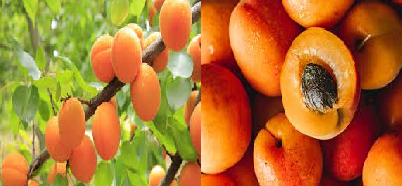
- Shakespeare may have insisted that apricots are an aphrodisiac, but let’s give this fruit its real due by celebrating its ability to iron out
- For starters, apricots are bursting with beta-carotene, a form of carotene that gives many fruits and vegetables, such as carrots and sweet potatoes, their characteristic orange color.
- Beta-carotene can turn wrinkle-forming free radicals into harmless compounds.
- As one of the best sources of beta-carotene on earth, apricots are packed with free radical scavenging abilities.
- A great source of iron, apricots can also help your skin look more radiant.
- Your red blood cells need iron to carry oxygen around your body, including to your
- The skin needs oxygen to complete the metabolic processes necessary to maintain its strength, firmness, and resilience.
- Apricots also contain vitamin B, potassium, and other important vitamins and minerals, making them a wonderful addition to your wrinkle-fighting diet.
Also Read: How to Can Peaches and Other Fruits with or Without Sugar.
The Uniqueness of Apricot
- Fruit is not normally thought of as a source of fat, but apricots contain linoleic and oleic fatty acids.
- You may know these fats by their more common family names: omega-6 and omega-9.
- These polyunsaturated fats are healthy fats that play an important role in cell health, including the cells of your skin.
- Skin cells use these healthy fats in their membranes, and membranes containing healthy fats are better able to absorb nutrients and produce skin-strengthening compounds. Stronger skin means fewer wrinkles.
- Although apricot oil is commonly used in the cosmetic industry to improve dry and wrinkled skin, you need not apply these oils
- Eating apricots and other natural sources of oleic and linoleic fatty acids can help nourish your skin from the inside out.
What’s the best way to eat apricots?
- Fresh is best, as fresh fruit has the most antioxidants and other healthy nutrients.
- Dried apricots are also a healthy choice as they contain many of the wrinkle-fighting antioxidants found in fresh apricots and are a good source of iron.
- No matter which way you choose to eat apricots, they will certainly help iron out wrinkles.
#05. BLACKBERRIES
Luscious, dark-purple berries with a mouth-watering tart taste, blackberries are a delicious addition to your wrinkle-fighting diet.
The common blackberry is normally available in late spring and early summer, but growing interest in this antioxidant-rich berry means that you can now find supplies at the supermarket almost year-round.
What is all the hype about?
- Blackberries are an antioxidant-rich food, making them powerful fighters of free radicals and, thus, excellent wrinkle
- Blackberries have an ORAC value (a measurement of antioxidant levels) that is just shy of that found in blueberries, which have one of the highest ORAC values of any food on
- Blackberries are also particularly high in anthocyanins, a group of flavonoids that are powerful antioxidants and can benefit your skin by putting these antioxidants to work at reducing inflammation.
- Blackberries are also a naturally rich source of bioflavonoids and phenolic compounds, two cancer-fighting antioxidants.
- A 2004 study examined the effects of fresh blackberry extracts on the proliferation of cancer cells.
- The findings suggested that blackberry extract is an effective scavenger of free radicals and inhibits the growth of cancer cells.
- When it comes to wrinkles, the antioxidants in blackberries have a potent ability to prevent free radicals from triggering wrinkle-forming damage.
- Finally, blackberries are a good source of vitamin E, one of the most important fat-soluble antioxidants in the body.
- Your skin contains fats that can be “oxidized,” which is science-talk for damage.
- Free radicals cause fat oxidation, which in turn causes
- Blackberries provide a natural source of vitamin E to help keep your skin fats healthy and your skin looking radiant and wrinkle-free.
#06. BLUEBERRIES.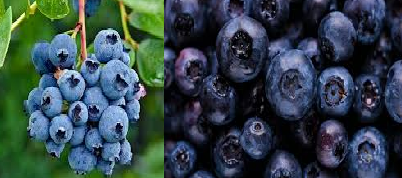
- Blueberries may have started the antioxidant superfood revolution, and that certainly isn’t a bad thing, since superfoods are known to help fight aging, including wrinkles.
- Their fame is largely based on the fact that a serving of fresh blueberries provides more antioxidant activity than most other fresh fruits and
- Anthocyanins are the blue-red pigments found in blueberries.
- These powerful antioxidants protect the integrity of support structures in the skin and veins, which means stronger, healthier skin with fewer wrinkles.
- It also means stronger, healthier blood vessels, which help improve the nutrient and oxygen supply to your skin, giving it a radiant, healthy glow.
- Research has found that anthocyanins stabilize the collagen matrix, the main structure of your skin, by inhibiting enzymes that slice the collagen matrix.
- They also prevent free-radical damage to the matrix and encourage cross-linking of collagen fibers to form a more stable matrix.
- A healthy, stable matrix results in firm, youthful-looking skin.
- Despite the popular belief that red wine is the ultimate source of anthocyanins, blueberries contain 38 percent more of these free radical fighters and they’re significantly lower in calories, too
- Toast your skin’s health with a bowl of blueberries and enjoy antioxidant powers that are known to improve your night vision and fight heart disease, cancer, and wrinkles.
Also Read: How to Can Blackberries and Other Berries with No Other Ingredient.
Which Berry Is Best?
- There are approximately 30 different species of blueberries.
- Choose blueberries that are firm and have a lively, uniform blue color.
- Here’s a great trick when shopping for the best berries:
- Shake the container.
- If the berries move freely, buy them;
- If they do not, they are probably mushy, damaged, or moldy and should be avoided.
- Ripe blueberries should be stored in a covered container in the refrigerator, where they will be kept for about a week.
- Wild blueberries pack more antioxidant power per bite than cultivated
- Organic wild blueberries are even
- If you cannot find either, any blueberry is a better wrinkle-fighting snack than chips, chocolate bars, or candy.
- When blueberries are not available fresh, keep some in your freezer and add them to pancakes, smoothies, or your favorite oat or bran baked goods.
- Anthocyanins can be found in both fresh and frozen blueberries, but not in processed foods, which include baby foods and canned foods.
#07. CANTALOUPE.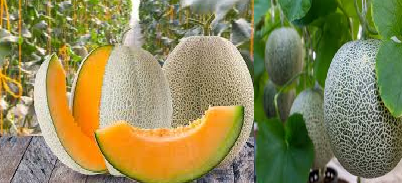
The cantaloupe belongs to the same family as the cucumber, pumpkin, and squash, three other skin-healthy foods.
Bite into this delicious, nutrient-filled snack and say goodbye to wrinkles.
When you think of vitamin C, you probably think of citrus fruits, but cantaloupe is a tremendous source of this wrinkle-fighting vitamin.
Just one cup (160 g) of this juicy melon supplies your entire recommended daily amount of vitamin C, which renders free radicals harmless, thus preventing them from damaging the collagen that provides structure to your skin.
Vitamin C is one of the ultimate wrinkle-fighting antioxidants because it not only stops free radical damage but also regenerates vitamin E, another potent antioxidant in your skin.
Why would vitamin E need regenerating?
- Because after disarming a free radical, vitamin E converts into its inactive form. Vitamin C can reactivate the vitamin E so that it can disarm more free radicals and inhibit wrinkle formation.
Cantaloupe is also an excellent source of vitamin A.
- Because vitamin A is a fat-soluble antioxidant and vitamin C is a water-soluble antioxidant, cantaloupe offers your skin a dual-action approach to fighting free radicals.
- The body can create vitamin A from beta-carotene.
- A cantaloupe’s gorgeous orange color is due to its concentrated amount of beta-carotene, which effectively reduces free radical damage in skin cells.
- In addition to vitamins C and E and beta-carotene, this sweet melon also offers you lots of potassium, vitamin B6, and folate, all of which support healthy, beautiful skin.
Also Read: Easy Way to Prepare Dandelion Wine at Home
Cantaloupe contains B complex vitamins, which support energy production by aiding sugar metabolism in the body.
- In addition, there is a good amount of fiber in cantaloupe, which helps ensure that its sugar is delivered into the bloodstream gradually, thus stabilizing blood sugar levels.
- Plus, fibrous foods make you feel satisfied after eating them, so you’ll be less likely to snack on other, less skin-healthy foods.
- The cantaloupe is named after the Italian village of Cantalupo, where it was first cultivated in 1700 D.
- Luckily, you won’t have to travel there to enjoy this delicious wrinkle-fighting fruit. In the United States, the cantaloupe is the most popular variety of melon.
- It’s North American growing season runs from June through August; however, you are likely to find them widely available throughout the year.
- Sliced cantaloupe is a refreshing snack and can be a colorful, sweet addition to many salads.
- Try adding melon cubes to your next smoothie or a yogurt parfait.
#08. KIWI.
Did you know the kiwi is also called the Chinese gooseberry?
Contrary to popular belief, kiwi is not native to New Zealand but rather originated in China.
Today, it’s commercially grown in both California and New Zealand.
- Kiwi is one of the best wrinkle-fighting foods in the world because it is packed with vitamin C—one cup (175 g) of kiwi offers you 275 percent of your recommended daily allowance (RDA).
- Vitamin C is water-soluble, which means it can travel all over your body, including to your skin, to prevent collagen damage caused by free radicals.
- The human body can store only a certain amount of vitamin C, so it is important to include foods rich in vitamin C in your diet throughout the day.
Need another reason to include kiwi in your skin-beautifying diet?
- Researchers have found that kiwi fruit can double collagen synthesis in the skin.
- To a lesser degree, it can also stimulate fibroblast growth, all of which translates to stronger skin with a better structure that is less likely to show wrinkles.
- Kiwi fruit also helps your skin rejuvenate.
- Polysaccharides in kiwi fruits have been found to stimulate skin cell proliferation (formation) by up to 30 percent.
- This means that more young, healthy skin cells are being manufactured to help you maintain a glowing complexion.
- Sliced kiwi is a refreshing and delicious snack.
- Add kiwi to your fruit salad, include it in a spinach salad, or eat it for a low-calorie dessert.
- For the best wrinkle-fighting results, select a kiwi that is firm with no signs of decay.
Next article will be on nuts and seed that could help fight wrinkle skin join our social platforms for more.
Join Enlighten Knowledge WhatsApp platform.
Or
Join Enlighten Knowledge Telegram platform.

